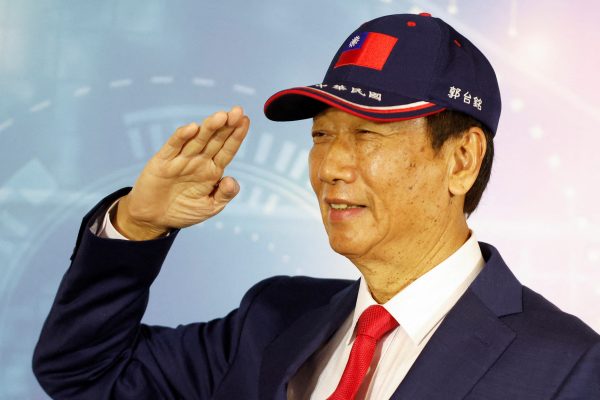Yet, a careful assessment suggests that Gou’s sustained involvement might influence the electoral outcome, potentially benefiting the incumbent party’s nominee, Vice President Lai Ching-te.
Gou, renowned as a business magnate, projects himself as a harbinger of transformative change, particularly in advocating enhanced cross-strait diplomacy. The implications of his candidacy on Taiwan’s political tapestry require consideration.
Gou published an op-ed on 17 July to delineate his perspective on cross-strait tranquillity. He underscored the imperative of aligning with the ‘one China’ tenet. Though this resonates with Gou’s outlook, it highlights the plateauing of his domestic endorsement. While Gou acknowledges the Taiwanese desire for peaceful relations, his stance overlooks the palpable concerns many Taiwanese have regarding China’s intensifying overtures. A study conducted by Duke University reinforces this notion, revealing that over 70 per cent of respondents view Beijing’s disposition toward Taiwan as antagonistic.
His endorsement of the ‘one China’ framework lacks clarity, casting doubts among many Taiwanese who value the island’s autonomy. Gou’s overtures to Western media, emphasising his allegiance to the ‘one China’ policy, highlight his diplomatic outloook to both Beijing and Washington. This inclination appears to lean towards a more amicable stance with China under his leadership. Yet, this positioning poses the risk of distancing Taiwan from the United States — a steadfast ally — at a juncture of heightened China–US discord.
Foxconn’s stance on workers’ rights could also pose challenges to Gou’s candidacy. With global apprehensions surrounding certain manufacturing practices in China, Gou — as the former head of one of the world’s leading manufacturing corporations — faces potential conflicts of interest. Gou’s purported ability to navigate relations adeptly with both Beijing and Washington might face hurdles given Foxconn’s tarnished reputation in the United States, particularly in light of the company’s ill-fated investment in Wisconsin.
Gou’s decision to choose Tammy Lai — known for her depiction as a presidential candidate in the Netflix series ‘Wave Makers’ — as his vice-presidential pick could appeal to the younger voters. Yet, Lai’s recent renunciation of her US citizenship, while not infringing upon any requirements set by Taiwan’s election laws, does raise questions regarding Gou’s sincerity and strategic intentions in the political arena.
While Gou faces a myriad of challenges, his involvement in the electoral process stands to profoundly shift the political landscape, particularly given his stance on cross-strait relations. This aligns him closely with the Taiwan People’s Party Chairman Ko Wen-je and Kuomintang’s Hou You-yi, suggesting a significant overlap in their support base. Conversely, Democratic Progressive Party Vice President Lai Ching-te, though open to dialogue with Beijing, stands apart due to the party’s historical backing for Taiwanese independence.
For a sizeable segment of the Taiwanese electorate, the 2024 election significantly influences the nation’s future stance on cross-strait relations. While the election holds personal significance for Gou, his initial endorsement of the Kuomintang candidate, followed by his independent bid, accentuates the volatile nature of political allegiances and underscores the elevated significance of this presidential contest.
Despite the limited prospect of a Gou-led presidency, the potential significance of his political influence cannot be rushed aside. Securing substantial support before the election might not get him the presidency but could position him as a ‘kingmaker’. Such a position might prove instrumental in resolving any deadlock within the opposition, ensuring that Gou’s candidate clinches the presidency.
Gou’s recent campaign efforts display a shrewdness in communication strategies. It involves a play on the phonetic qualities of his Chinese name, implying the English expression of ‘good timing’. This manoeuvre subtly invites support, suggesting that now is the opportune moment to rally to his cause.
If this envisioned change in governance remains unfulfilled, questions arise about whether Gou’s strategic moves serve the greater good of Taiwan. Given the current state of Taiwan’s political climate, this may be the only time Gou can establish a favourable political position. Should he drop out of the race and join the opposition party, Gou may secure a place in the new government and a strong position to pursue future political ambitions.
Aligning with opposition parties could lead to a broad coalition achieving victory in January, potentially enabling a peaceful transition into a new Taiwanese administration focussed on improving cross-strait relations. Amid heightened tensions with China, reopening proper dialogue channels will contribute to securing a safer climate for continued de facto Taiwanese sovereignty. Big elections are often won on small margins. Even if Gou only commands 5–10 per cent of the vote, this could push a coalition partner to victory. It will all come down to whether Gou can settle for being the kingmaker, or if he truly believes he can become the king.
Dennis LC Weng is Associate Professor of Political Science at Sam Houston State University and Founding Chief Executive Officer of the Asia Pacific Peace Research Institute.
Jared Jeter is a Master’s student at National Chengchi University and Research Associate at the Asia Pacific Peace Research Institute.

